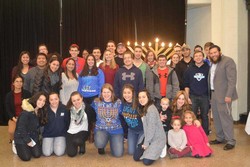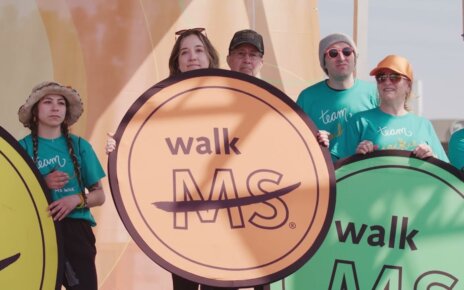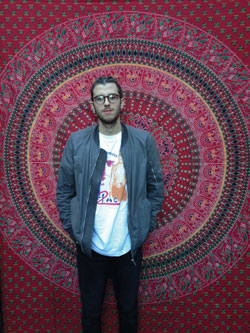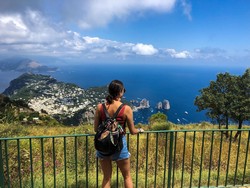Chanukah, the miracle of lights, is celebrated among many students at Monmouth University. It is a celebration of one day’s worth of oil lasting eight days, when Jewish soldiers thousands of years ago were forbidden by ancient Greeks from practicing Judaism in the holy land. Together, with the warmth of family, the lighting of the menorah each day symbolizes the miracle of how many days the oil lasted.
Chanukah traditions keep the joy of the holiday alive each year. Matthew Cohen, a sophomore computer science student, shared his favorite tradition. “The lighting of the menorah because it’s a visual way to remember history and reenact the story of Chanukah thousands of years later,” he said.
Cohen loves being able to embrace his Jewish heritage at Monmouth with Chanukah. Having this on campus is important to him, “It’s good because a lot of other kids are Jewish here and it’s cool to see a lot of us come together, especially this past Tuesday, for the lighting of the menorah and appreciate and experience our culture together.”
The joy of the holiday is spread on campus with Chabad of Monmouth University, the on-campus organization that provides a tight-knit community for Jewish students.
Rabbi Yaakov Greenberg, adjunct professor of Intro to Judaism and advisor of Chabad, shared his favorite Chanukah tradition. “It’s definitely finding Jewish people who weren’t planning on celebrating the holiday and giving them a menorah enabling them to observe the holiday of Chanukah,” he said.
He encourages students here at Monmouth to get involved with the traditions by “sharing with them the beauty, relevance, meaning, and importance of their Jewish heritage and tradition.”
Some regularly followed Chanukah traditions are lighting the menorah, playing dreidel, and eating foods cooked with oil. A menorah has eight candles to represent each night the oil added, and a ninth candle used to light the others.
The dreidel was a tool used to trick the ancient Greeks and make them think that the Jewish soldiers were gambling. In reality, they were studying Torah! The different Hebrew letters on the dreidel, nun, gimmel, hey, and shin, stand for “a great miracle happened there,” as in the holy land. Now, the spinning of the dreidel is enjoyed by many, especially children, at this time of celebration.
Oily, fried foods are eaten as a tradition to commemorate the miracle of eight days of oil. A Chanukah favorite is sufganiyah. This is a ball of fried dough with jelly on the inside, and covered in powdered sugar. Another favorite is a potato latke. A potato latke, otherwise known as a potato pancake, is another fried food eaten on Chanukah.
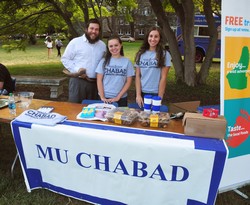 Shaina DeLeon, a freshman nursing student, explained the mix of her favorite Chanukah traditions. “My favorite Chanukah tradition is lighting the menorah. I love saying the blessing and seeing all the pretty multicolored candles gleam. I also just love a good excuse to eat sufganiyot and latkes,” she said. Thanks to the active Jewish community on campus within the Chabad club, she gets to experience both lighting the menorah and enjoying traditional Chanukah dishes.
Shaina DeLeon, a freshman nursing student, explained the mix of her favorite Chanukah traditions. “My favorite Chanukah tradition is lighting the menorah. I love saying the blessing and seeing all the pretty multicolored candles gleam. I also just love a good excuse to eat sufganiyot and latkes,” she said. Thanks to the active Jewish community on campus within the Chabad club, she gets to experience both lighting the menorah and enjoying traditional Chanukah dishes.
Another unforgettable Chanukah tradition is spending time with loved ones as in family and friends. Lighting the candles surrounded by friends and family is an honorable tradition to remember the miracle of light.
Cooking and enjoying food that is made with oil is another splendid way to remember this miracle. The tradition of celebrating with loved ones is important because it continues to address the triumph of the Jewish soldiers.
Chanukah is a holiday of remembrance and will live on through celebrations of the miracle of light.
PHOTO COURTESY of Monmouth University
PHOTO COURTESY of Cameron Oakley

